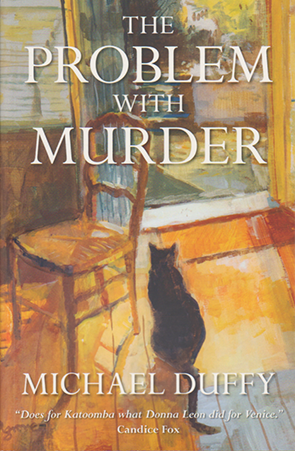



Bella Greaves Series #1
- Category:Crime Fiction, Australian Fiction, Interview
- Date Read:6 January 2022
- Pages:297
- Published:2021

Note: Toriaz and I both bought our own copies of The Problem with Murder. Our opinions expressed in this review are independent of the author and publisher and the decision to include links for the book at the end of this review are entirely our own.
The Problem with Murder is set during the autumn and winter months in the Upper Blue Mountains, west of Sydney. Michael Duffy’s narrator, Bella Greaves, describes this season as a period of mist, fog and potential snow. Paul Ruel, who has gained a level of notoriety from his television appearances on the news as a Sydney detective, has now been transferred to Katoomba, a small-town police station serving the tourist community, where his career seems destined to die, after an ill-advised media appearance, not to mention the usual politicking of ambitious rivals. Paul finds himself on the outer with the local police and held somewhat in contempt for his big city credentials and semi-celebrity. When Michelle Mackerras, the wife of Paul’s retired predecessor, Brad, is injured in a car accident, Paul has an intuition that something is not quite right between Michelle and her husband, both widely regarded throughout Katoomba. Paul’s intuition encourages him to investigate one of Brad Mackerras’s former cases, Suzie Porter, who now awaits trial in prison for the murder of her partner. Paul’s suspicion that Suzie was the victim of domestic violence, a factor seemingly overlooked when her bail was refused, has personal and profession implications that will threaten the reputation of local police, particularly retired Brad Mackerras, and put Paul at odds with his new commander, Leanne Walton. Furthermore, his sense of isolation from the Katoomba force will push Paul to seek help from the only person he is meant to avoid as part of the terms of his new position: Bella Greaves, a journalist working on the local newspaper.
The Problem with Murder is a slow burn. It doesn’t have a shock and awe opening involving a horrific crime with all the seedy routine that that implies. Duffy trusts his reader to be patient, to follow Ruel’s initial curiosity about Michelle Mackerras’s accident and to see where that leads. He wants us to know his characters and the world they inhabit. As Ruel begins to uncover some of the town’s secrets the tension mounts, and we find that our patience is rewarded with a satisfying crime thriller, spiced with a suggestion of mountains-variety Gothic that imbues the story with ominous moral undertones.
If this sounds interesting, then well and good, but be aware that unless you live in the Blue Mountains, or are willing to take a trip up from Sydney, you will not be able to buy this book in your local bookstore. A note at the front of the book states The Problem with Murder, “is possibly the first novel to be available only at shops mentioned in its text.” In case you’re wondering, that’s only four bookstores in the Upper Blue Mountains, west of Sydney: Gleebooks, The Little Lost Bookshop in Katoomba (itself the subject of another blogpost), Megalong Books in Leura, and Lamdha Books in Wentworth Falls. Our curiosity over this decision was answered by the author, himself, after he read Toriaz’s blogpost: “The point is to keep it personal, and local. There are enough international books already!”
Which brings me back to the question of why someone might want to read this book in particular, given that crime fiction is such a well-stocked genre. First, is the obvious: you may wish to read a good book. Both Toriaz and I enjoyed this book. It’s well written, it has identifiable characters, there is an element of intrigue, as well as having what a good crime novel should possess: a level of unpredictability.
But I think, given that Duffy has made the local setting of the upper mountains an integral part of his story, and that he has limited its distribution to the area in which the story takes place, that the book also has two other specific audience appeals. If you’re local to the Blue Mountains, the idea of a local story is enticing. Americans or the English, for instance, may be used to having their cities written about and filmed. When I was in California, I remember thinking how familiar the place seemed because I’d already seen so much of it in movies. But reading about other places – Australia has many good authors but much of my reading is set somewhere else – involves an intellectual (I mean imagining a world with the mind through the text alone) rather than an emotional or near-tactile response to a story when there isn’t an attendant understanding of place and people that being a local affords. With that in mind I would recommend this book to locals not only because it’s a good book, but because they’ll get the way Duffy has used setting and atmosphere to enliven the tension of the story and elevate the moral questions raised by his narrative.
A second specific audience is tourists to the area, particularly overseas tourists who may want to sample something of the local flavour of the mountains. Besides reading a good book, it also has the potential for a kind of treasure hunt, to track down many of the local places mentioned in the story. When we finished reading the book Toriaz and I spent a day in the upper Mountains revisiting many of the places mentioned in the story and were treated to suitably misty day for the right atmosphere. So, it’s a good souvenir, too.
And while the crime story is entertaining, my interest was most aroused by Duffy’s evocations of place, not because I intimately know many of the locations of the story, but because he transforms the Mountains into a universe which philosophically reflects the moral undertones of the community; a community in which children may be sexually abused, in which women may suffer domestic violence, even where murder may occur, yet where exists a veneer of respectability and civility. It reminded me of Conrad’s use of the Congo River in Heart of Darkness, as a representation of Marlowe’s psychological journey towards the madness of Kurtz and the darkness that lies within civilised hearts. Bella Greaves, Duffy’s narrator, observes that:
The experience of being in the area is not the typical human encounter with mountains, which, like tall trees and gothic cathedrals, draw the eye up to the sun and stars and notions of heaven and infinite space.
However,
In the Blue Mountains though, people spend most of their viewing time looking down, not up […] The valleys are certainly impressive in their way, but as enormous holes in the ground, as expressions of emptiness.
Later, Bella observes, “Possibly human beings are not meant to live on the edge of such emptiness.” Like Marlowe travelling upriver, the nearness of this vast emptiness feels like the latent potential for humanity’s darker deeds. Indeed, Bella’s narrative recalls Nietzsche’s warning “Battle not with monsters, lest ye become a monster, and if you gaze into the abyss, the abyss gazes also into you.” This is not merely theoretical speculation: Bella’s insight intersects with the realities of crime and corruption in the town. The fog rolls across the landscape and obscures it in much the same way as lies and deceit conceal dark secrets. And good people – a detective like Paul Ruel, for instance – must find their own line between means and ends when looking into the abyss.
I think this is what makes this a good book, beyond it being an entertaining and highly readable crime fiction. There are moments in the book that offer a moment to pause and think.
As I read Bella’s unfolding account, for instance, I could not separate the reading experience from my knowledge of the localness of this book – of the author’s decision to limit its distribution – and its hints of the wider world in which we now live: divorced from the local, from the here and now; the Global. When Paul Ruel’s son and daughter come to visit him, he discovers to his dismay that his son, Sean, has stopped playing sport. Instead, he is engaged with a group of friends – meaning people he has never met and who live oversees – with creating a computer game. Sean is responsible for the physical layout of the world, “with two levels, plateau and valleys, with a number of steep railways the only connection between them.” As such, Sean is interested in the Scenic Railway (a former coal railway which has been long used to take tourists into the Jamison Valley) as an inspiration for the game, not in and of itself. It is details like this, added to details about the pressure the internet has had on industries, even on journalism as Bella Greaves has found, that seem to suggest the dark potential of a civilisation we have built which mirrors the emptiness of the wilderness beyond.
The Problem with Murder is only available in Blue Mountains bookstores but I thought to ask the proprietor of Lamdha Books whether that meant online sales to other regions were also limited. Of course they’re not. If you’re interested in obtaining a copy of this book, follow one of the links below:
The Little Lost Bookshop, Katoomba
The Gleebooks website represents stock in their city store, so it does not list the book at the time of writing. I don’t know if the links above will remain active in the future. They are active at the time of writing.
An Interview With Michael Duffy
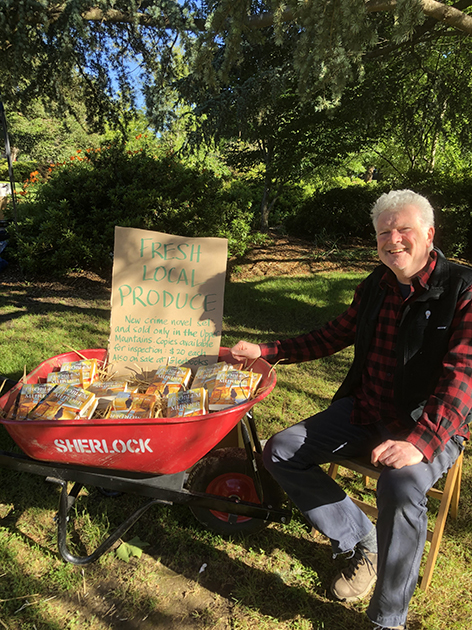
Michael Duffy is a former journalist for the Sydney Morning Herald and the author of The Problem with Murder, set in the Blue Mountains west of Sydney where we live. It is available only from the Blue Mountains bookstores featured in the book (and online).
Michael Duffy contacted the Reading Project after we showed an interest in his book. He agreed to answer some questions for this website.
Thankyou, Michael for speaking to the Reading Project. You’ve written several crime novels. What drew you to the crime genre?
First can I say thank you very much for your interest in my unusual book.
I was always a writer. As a court reporter for the Sydney Morning Herald, I came across some people and stories that called out for more extended treatment. I wrote two true crime books, and then moved into fiction, because I wanted to portray more of what went on in the hearts and minds of people involved in these stories. In real life they're often still traumatised and not very reflective, but I felt I'd built up some understanding of their situations that I wanted to put down on paper.
You have another series (Nicholas Troy series) set in Sydney which is a more conventional police procedural. The first opens with a body falling from a high rise building into a police car. It has a very different feel to The Problem with Murder. What did you try to do differently with this book?
That was an attempt to portray real police work, and police, accurately. For that reason, and because of his youth, Nick Troy was deliberately quite a limited character. I think the Bella Greaves books - I hope to do a sequel this year - are more thoughtful. Having Bella in them as well as the detective Paul Ruel allows a richer level of reflection and description, which is important to me now.
At one point (p.28) Bella thinks that she, like other serious journalists, looked down on crime stories. Given your background as crime writer for the SMH, was this a self-deprecating joke, or the reality of relative ‘rank’ in journalist circles?
Crime reporting has traditionally been considered tabloid and avoided by serious journalists, and their readers. The crime reporting of the Daily Telegraph in Sydney has always been superior to that of the Sydney Morning Herald. That is changing, for example we've seen ABC TV and the broadsheet Australian newspaper get seriously into crime over the past five years. I'm not sure why that is, but I know some serious reporters still won't touch crime. It's considered lurid and devoid of social or cultural purpose.
Paul has difficulty adjusting to his new posting. Do you think there are differences between Sydney and Mountains communities?
Detectives in the Homicide Squad in Sydney often talk or even boast about being "in the A grade". The other specialist squads there, such as Gangs and Sex Crimes, would be the B grade, followed by the rest. It's all about the level of crime they get to deal with, and that's why Paul feels aggrieved, because there are so few professional criminals - or crimes - in the Mountains for him to deal with. Partly that's due to the small population, and partly it's because of the sort of people who live here. We're fortunate not to have social problems to the same extent as some parts of Sydney, which produce a lot of crime.
Paul Ruel seems to be a very flawed detective. For all his big city reputation, he seems to make a lot of bad decisions in Katoomba. Was this to make the character easier to empathise with? Or are his issues meant to reflect the systemic problems that he faces?
I don't say this in the book, but to my mind, Paul's suffering PTSD from being betrayed, as he sees it, by his bosses in Sydney, and then sent into exile. Like many cops, the police force became his whole moral and social and cultural world, and when that let him down, he fell hard. In this book he's still picking himself up. I'm very sympathetic to him.
A note at the front of your book makes a clear delineation between your fiction and reality: the Katoomba police and the local newspaper. Without mentioning names, were Paul Ruel and Bella Greaves based on real people?
Nothing in the book or these reflections applies to the real Blue Mountains police. So far as I know, they're thoroughly decent people doing a fine job.
Like most characters in novels, mine are composites, based on a lot of real people. Bella, as someone around 60 years old, is partly a meditation on the modern experience of ageing, as it affects people I know. I was keen to show an older person who is still more than capable of doing important things professionally. I don't think our society is doing a good job in harnessing all the energy and creativity going begging in healthy older people. Bella is a role model!
Domestic violence is an important factor in your story. To what extent do you think your book reflects the reality of communities like Katoomba, and how do you account for that?
It's a huge problem in every suburb and community. I assume it's always been so, we just didn't do as much about it before. I very much want in my crime novels to reflect reality, and if you talk to ordinary cops, that's their reality. For me, crime novels should be real and respect their subject matter. The idea of writing - and reading - crime for simple entertainment is not one I feel at all comfortable with.
There are themes of alienation, exclusion and concealment running through your book, as well as Paul’s son, Sean, who collaborates with ‘friends’ on a computer game. Do you see alienation as a state of modernity?
Yes, I think social media (which is not media at all) reduces the ability to concentrate, meaning people are less able to read books or even long answers such as this! More generally, I think democracy is based on (real) media, and as that media diminishes, so too does democracy.
What was behind your limiting the distribution of this book to the Upper Mountains bookstores?
After the fires two years ago, some friends and I got together to see what we could do to help the local economy recover. Someone who worked in a bookstore said they needed local content to sell to tourists, and so I decided to write this book. Given that was its purpose, I felt no reason to sell it anywhere else. I also liked the idea of a book available only in shops mentioned in the text. I couldn't find a publisher prepared to embrace this rather unusual vision, so I published it myself! I'm grateful to Gleebooks, Little Lost Bookshop, Megalong and Lamdha Books for selling it. I think I'll try to add a few more stores (in the Mountains) for the next book, for commercial reasons.
The Problem with Murder at times had a rather gothic feel to it, with the use of location and atmosphere. Do you think there is the potential for there to be a ‘Blue Mountains Gothic’, similar to Tasmanian Gothic?
I'm not sure exactly what the term 'Gothic' means. I am very interested in including anything unique to the Mountains, from weather to landscape to strange stories. I want to celebrate all this, but more importantly, I believe this sort of thing makes a region real, at least for me. I think Aboriginal people express this in their concept of 'songlines', not that I claim any expertise in that area. But writing and reading about the place where I live is very important to me.
The idea that civilisation breaks down the farther you get from the centre (like Marlowe travelling up the Congo in Heart of Darkness) is an old one. What importance do you place on setting?
I think the interesting thing about smaller communities is that people in them are forced to deal with a wider range of other people than they are in a city, where people tend to isolate themselves with others like themselves, whether at work or home. (Obviously Sydney in total has a wider range of people than the Mountains, but down there, no one person actually experiences that breadth.) This is another of the ways the Mountains setting is important for me.
Now that you’ve written a very different paced book, do you think you will return to a more conventional crime fiction with more Troy novels?
No. I'm very keen to write, and publish, more Bella Greaves books. I used to be a publisher and I'm enjoying doing a little of it again, and the unusual experience of publishing to a community where I know many of the booksellers and readers. I set up a store at the Blackheath Growers Market in December, and it was fun.
Is there likely to be a Bella Greaves / Paul Ruel series?
Yes, I'm glad to say a few of the shops have asked for one. The Strange Death of Paul Ruel will appear in November 2022, at all good bookstores - so long as they're in the Blue Mountains! My wife Alex Snellgrove did the cover for The Problem with Murder, and people liked the picture and the cat a lot. Alex will do the next cover, and perhaps some cat cards.
The Bella Greaves Series
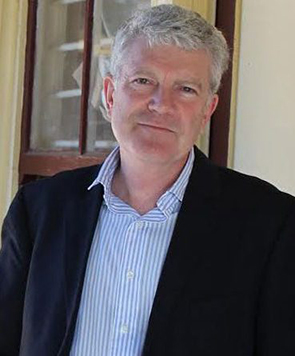
The Blue Mountains Bookshops
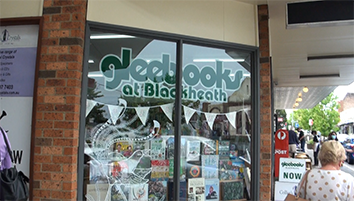
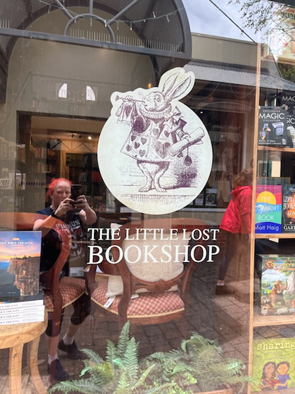
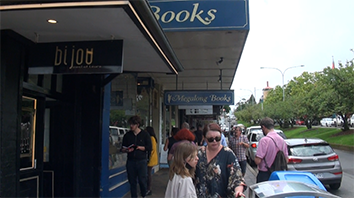
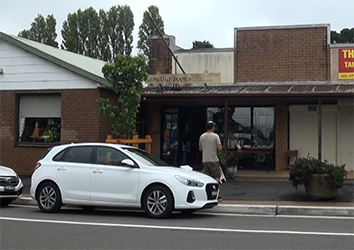
Look Down
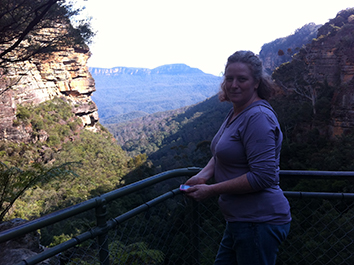
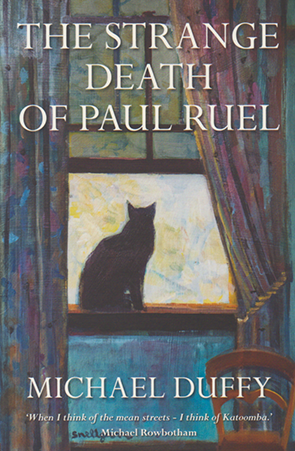
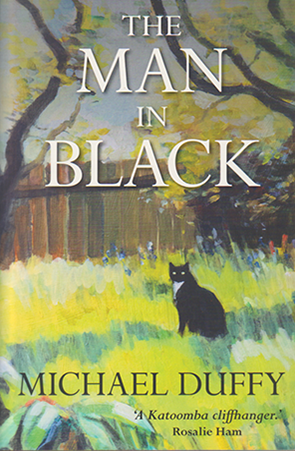

No one has commented yet. Be the first!